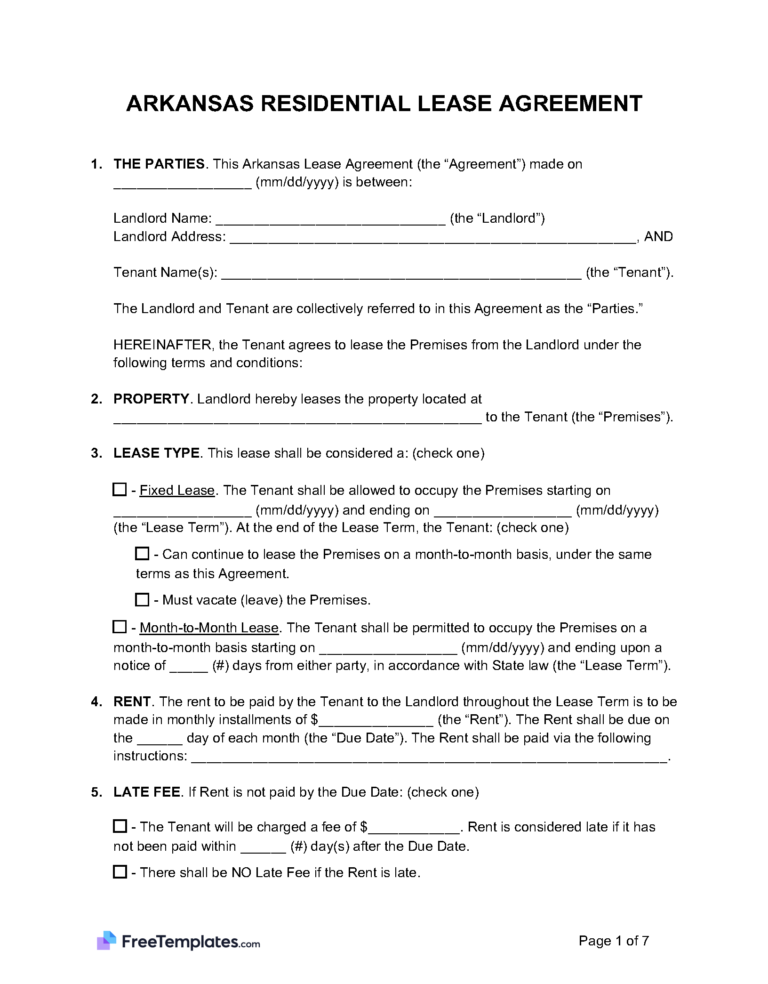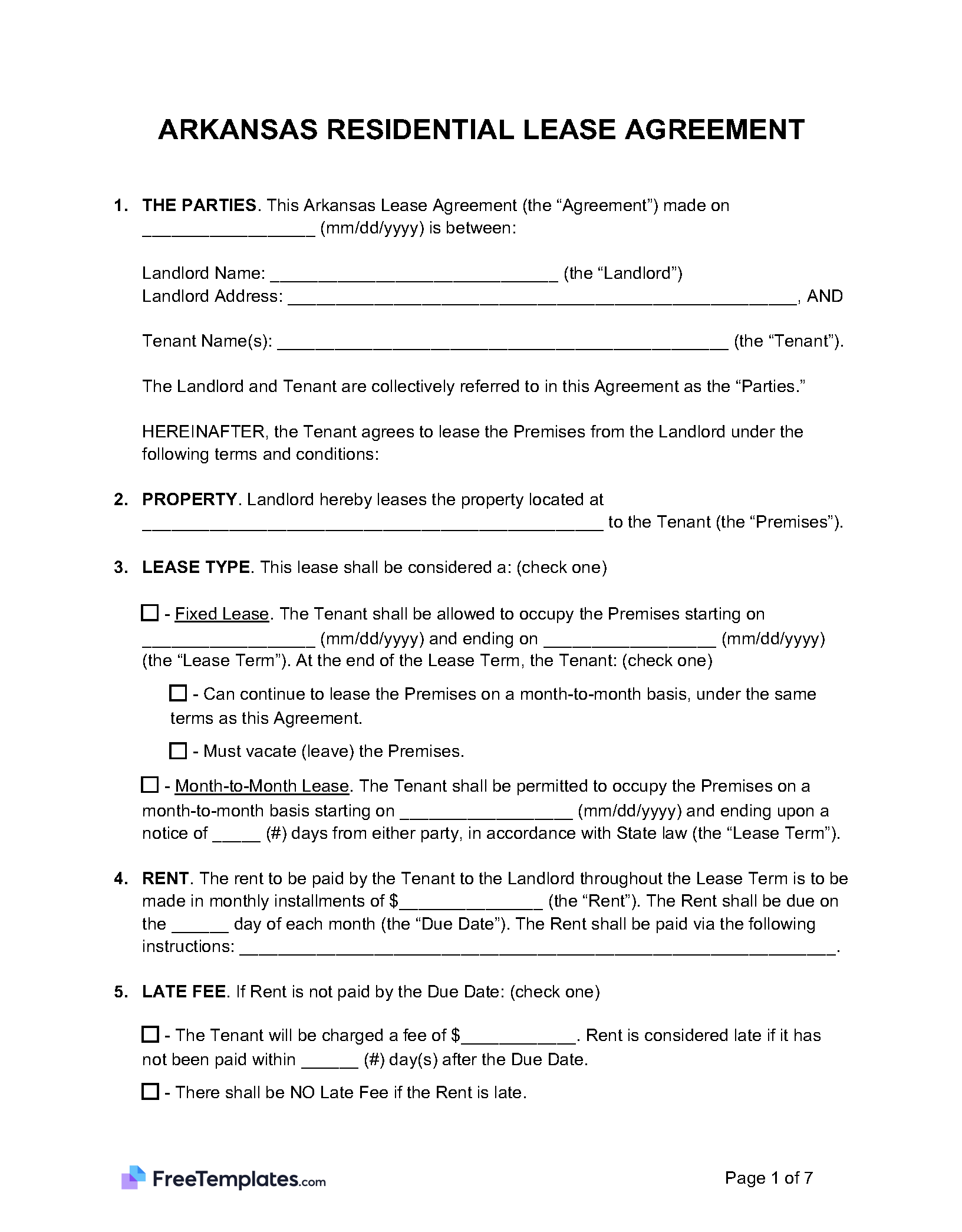By Type (6)
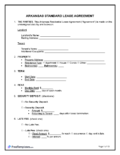 Standard Lease Agreement – A contract for a residential rental property, typically for a 12-month period. The legal document must follow Arkansas’ landlord-tenant laws, which oversee certain aspects of the lease, such as security deposits, eviction procedures, and maintenance responsibilities. Standard Lease Agreement – A contract for a residential rental property, typically for a 12-month period. The legal document must follow Arkansas’ landlord-tenant laws, which oversee certain aspects of the lease, such as security deposits, eviction procedures, and maintenance responsibilities. Download: PDF, MS Word, ODT |
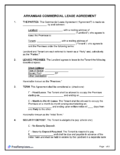 Commercial Lease Agreement – A legally binding document for renting a commercial property. The contract can include details such as the terms and conditions of renting the property for commercial purposes, rent, duration, and upkeep responsibilities. Commercial Lease Agreement – A legally binding document for renting a commercial property. The contract can include details such as the terms and conditions of renting the property for commercial purposes, rent, duration, and upkeep responsibilities.Download: PDF, MS Word, ODT |
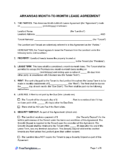 Month-to-Month Lease Agreement – A flexible rental contract between a landlord and a tenant. It allows a short-term commitment and the option to renew monthly. Month-to-Month Lease Agreement – A flexible rental contract between a landlord and a tenant. It allows a short-term commitment and the option to renew monthly.Download: PDF, MS Word, ODT |
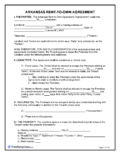 Rent-to-Own Agreement – A unique rental contract that gives the tenant an option to purchase the rented property at a later date. Typically, a portion of their rent will go toward the agreed-upon purchase price. This lease option provides a pathway to homeownership while renting. Rent-to-Own Agreement – A unique rental contract that gives the tenant an option to purchase the rented property at a later date. Typically, a portion of their rent will go toward the agreed-upon purchase price. This lease option provides a pathway to homeownership while renting.Download: PDF, MS Word, ODT |
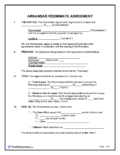 Roommate Agreement – A legal document between individuals sharing a rental property outlining each roommate’s responsibilities, including rent, utilities, and other shared living arrangements. Roommate Agreement – A legal document between individuals sharing a rental property outlining each roommate’s responsibilities, including rent, utilities, and other shared living arrangements.Download: PDF, MS Word, ODT |
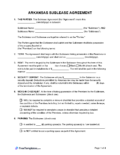 Sublease Agreement – A contract that allows a subtenant to rent all or part of the leased property from the original tenant, often with the landlord’s consent. The original lease agreement will remain in effect between the landlord and the original tenant. Sublease Agreement – A contract that allows a subtenant to rent all or part of the leased property from the original tenant, often with the landlord’s consent. The original lease agreement will remain in effect between the landlord and the original tenant.Download: PDF, MS Word, ODT |
Disclosures (1)
Lead-Based Paint Disclosure – Landlords are required to inform their tenants of any lead-based paint on the premises, as well as give them a lead hazard informational pamphlet.
Security Deposit
Maximum Amount – The landlord can charge a maximum of 2 month’s rent for unfurnished properties. Ark. Code Ann. § 18-16-304
- Furnished Units – The landlord cannot exceed 3 months’ rent for furnished properties for the security deposit. Ark. Code Ann. § 18-16-304
Returning to Tenant – The landlord must return the security deposit to the tenant within 60 days after the lease ends, minus any deductions for damages or unpaid rent. Ark. Code Ann. § 18-16-305(a)(1)
- Itemized List – Any deductions must be must be detailed in a written list. Ark. Code Ann. § 18-16-305(a)(2)
Landlord Access
General Access – Landlords must give their tenants reasonable notice, which is typically 24 hours before entering the property. Ark. Code Ann. § 18-17-602
- Reasons for General Access – Landlords can enter for non-emergency access, including entering for repairs and maintenance or showing the property to prospective tenants or buyers. Ark. Code Ann. § 18-17-602
Emergency Access – If the reasons for entering are threatening to life or property, such as fire or severe water leak, the landlord can enter the rental property without notice. This ensures the landlord can urgently address urgent situations without waiting for tenant permission. Ark. Code Ann. § 18-17-602
- Reasons for Emergency Access – If the issues threaten life or property, such as fire or a severe water leak, they constitute an emergency. Ark. Code Ann. § 18-17-602
Paying Rent
Grace Period – In Arkansas, the tenant has 5 days to pay their rent after the due date. Ark. Code Ann. § 18-17-701
Maximum Late Fee – Arkansas does not regulate the maximum late fee a landlord can charge a tenant for rent more than 5 days late.
Returned Checks (NSF) – For returned checks, landlords can charge a fee up to $30 or 5% of the face amount of the check, whichever amount is greater, plus any fees associated with the transaction. Ark. Code Ann. § 5-37-304(3)
Reasons for Eviction (4)
Non-Payment of Rent – The landlord can begin eviction if the tenant is more than 5 days late in paying their rent. Ark. Code Ann. § 18-17-701(B)
Non-Compliance – Excessive damage or violation of the lease agreement is cause for the landlord to begin eviction proceedings. Ark. Code Ann. § 18-17-701(A)
Illegal Activity – Illegal behavior on the rental premises, such as drug trafficking, can lead to eviction. Ark. Code Ann. § 18-17-701(A)
Holdover Tenancy – The tenant must leave the property after the lease expires. If not, the landlord can seek to evict. Ark. Code Ann. § 18-17-704(C-1)
